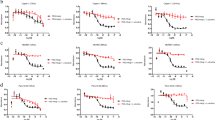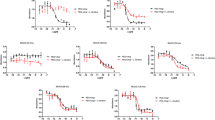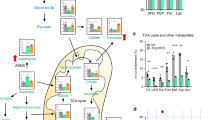Abstract
Deregulating cellular energetics by reprogramming metabolic pathways, including arginine metabolism, is critical for cancer cell onset and survival. Drugs that target the specific metabolic requirements of cancer cells have emerged as promising targeted cancer therapeutics. In this study, we investigate the therapeutic potential of targeting colon cancer cells using arginine deprivation induced by a pegylated cobalt-substituted recombinant human Arginase I [HuArgI (Co)-PEG5000]. Four colon cancer cell lines were tested for their sensitivity to [HuArgI (Co)-PEG5000] as well as for their mechanism of cell death following arginine deprivation. All four cell lines were sensitive to arginine deprivation induced by [HuArgI (Co)-PEG5000]. All cells expressed ASS1 and were rescued from arginine deprivation-induced cytotoxicity by the addition of excess l-citrulline, indicating they are partially auxotrophic for arginine. Mechanistically, cells treated with [HuArgI (Co)-PEG5000] were negative for AnnexinV and lacked caspase activation. Further investigation revealed that arginine deprivation leads to a marked and prolonged activation of autophagy in both Caco-2 and T84 cell lines. Finally, we show that [HuArgI (Co)-PEG5000] causes cell death by sustained activation of autophagy as evidenced by the decrease in cell cytotoxicity upon treatment with chloroquine, an autophagy inhibitor. Altogether, these data demonstrate that colon cancer cells are partially auxotrophic for arginine and sensitive to [HuArgI (Co)-PEG5000]-induced arginine deprivation. They also show that the activation of autophagy does not play protective roles but rather, induces cytotoxicity and leads to cell death.







Similar content being viewed by others
References
Cancer Facts & Figures 2018. American Cancer Society journal, CA: A Cancer Journal for Clinicians [updated 20182020]. https://www.cancer.org/research/cancer-facts-statistics/all-cancer-facts-figures/cancer-facts-figures-2018.html. Accessed Mar 2020
Araghi M, Soerjomataram I, Jenkins M, et al. Global trends in colorectal cancer mortality: projections to the year 2035. Int J Cancer. 2019;144:2992–3000.
Nasrallah A, Saykali B, Al Dimassi S, Khoury N, Hanna S, El-Sibai M. Effect of StarD13 on colorectal cancer proliferation, motility and invasion. Oncol Rep. 2014;31:505–15.
Al-Koussa H, Al-Haddad M, Abi-Habib R, El-Sibai M. Human recombinant arginase I [HuArgI (Co)-PEG5000]-Induced arginine depletion inhibits colorectal cancer cell migration and invasion. Int J Mol Sci. 2019; 20(23):6018.
Daaboul HE, Daher CF, Bodman-Smith K, et al. Antitumor activity of beta-2-himachalen-6-ol in colon cancer is mediated through its inhibition of the PI3K and MAPK pathways. Chem Biol Interact. 2017;275:162–70.
Shebaby WN, Bodman-Smith KB, Mansour A, et al. Daucus carota pentane-based fractions suppress proliferation and induce apoptosis in human colon adenocarcinoma HT-29 cells by inhibiting the MAPK and PI3K pathways. J Med Food. 2015;18:745–52.
Morris SM Jr. Enzymes of arginine metabolism. J Nutr. 2743S;134:2743S–S27472747 (discussion 65S-67S).
Kuo MT, Savaraj N, Feun LG. Targeted cellular metabolism for cancer chemotherapy with recombinant arginine-degrading enzymes. Oncotarget. 2010;1:246–51.
Mauldin JP, Zeinali I, Kleypas K, et al. Recombinant human arginase toxicity in mice is reduced by citrulline supplementation. Transl Oncol. 2012;5:26–31.
Khoury O, Ghazale N, Stone E, El-Sibai M, Frankel AE, Abi-Habib RJ. Human recombinant arginase I (Co)-PEG5000 [HuArgI (Co)-PEG5000]-induced arginine depletion is selectively cytotoxic to human glioblastoma cells. J Neurooncol. 2015;122:75–85.
Tanios R, Bekdash A, Kassab E, et al. Human recombinant arginase I(Co)-PEG5000 [HuArgI(Co)-PEG5000]-induced arginine depletion is selectively cytotoxic to human acute myeloid leukemia cells. Leuk Res. 2013;37:1565–71.
Stone EM, Glazer ES, Chantranupong L, et al. Replacing Mn(2+) with Co(2+) in human arginase i enhances cytotoxicity toward l-arginine auxotrophic cancer cell lines. ACS Chem Biol. 2010;5:333–42.
Davis FF, Abuchowski A, van Es T, et al. Enzyme-polyethylene glycol adducts: modified enzymes with unique properties. In: Broun GB, Manecke G, Wingard LB, editors. Enzyme engineering, vol. 4. Boston: Springer US; 1978. p. 169–173.
Harris JM, Chess RB. Effect of pegylation on pharmaceuticals. Nat Rev Drug Discovery. 2003;2:214–21.
Cramer SL, Saha A, Liu J, et al. Systemic depletion of L-cyst(e)ine with cyst(e)inase increases reactive oxygen species and suppresses tumor growth. Nat Med. 2017;23:120–7.
Wetzler M, Sanford BL, Kurtzberg J, et al. Effective asparagine depletion with pegylated asparaginase results in improved outcomes in adult acute lymphoblastic leukemia: cancer and Leukemia Group B Study 9511. Blood. 2007;109:4164–7.
Glazer ES, Stone EM, Zhu C, Massey KL, Hamir AN, Curley SA. Bioengineered human arginase I with enhanced activity and stability controls hepatocellular and pancreatic carcinoma xenografts. Transl Oncol. 2011;4:138–46.
Hernandez CP, Morrow K, Lopez-Barcons LA, et al. Pegylated arginase I: a potential therapeutic approach in T-ALL. Blood. 2010;115:5214–21.
Cheng PN, Lam TL, Lam WM, et al. Pegylated recombinant human arginase (rhArg-peg5,000mw) inhibits the in vitro and in vivo proliferation of human hepatocellular carcinoma through arginine depletion. Can Res. 2007;67:309–17.
Lam TL, Wong GK, Chong HC, et al. Recombinant human arginase inhibits proliferation of human hepatocellular carcinoma by inducing cell cycle arrest. Cancer Lett. 2009;277:91–100.
Nasreddine G, El-Sibai M, Abi-Habib RJ. Cytotoxicity of [HuArgI (co)-PEG5000]-induced arginine deprivation to ovarian Cancer cells is autophagy dependent. Invest New Drugs. 2020;38:10–9.
Glick D, Barth S, Macleod KF. Autophagy: cellular and molecular mechanisms. J Pathol. 2010;221:3–12.
Mizushima N. Autophagy: process and function. Genes Dev. 2007;21:2861–73.
Zhang N, Qi Y, Wadham C, et al. FTY720 induces necrotic cell death and autophagy in ovarian cancer cells: a protective role of autophagy. Autophagy. 2010;6:1157–67.
Wang J, Wu GS. Role of autophagy in cisplatin resistance in ovarian cancer cells. J Biol Chem. 2014;289:17163–73.
Cloonan SM, Williams DC. The antidepressants maprotiline and fluoxetine induce Type II autophagic cell death in drug-resistant Burkitt’s lymphoma. Int J Cancer. 2011;128:1712–23.
Al-Dimassi S, Salloum G, Saykali B, et al. Targeting the MAP kinase pathway in astrocytoma cells using a recombinant anthrax lethal toxin as a way to inhibit cell motility and invasion. Int J Oncol. 2016;48:1913–20.
El-Boubbou K, Azar D, Bekdash A, Abi-Habib RJ. Doxironide magnetic nanoparticles for selective drug delivery to human acute myeloid leukemia. J Biomed Nanotechnol. 2017;13:500–12.
Kassab E, Darwish M, Timsah Z, et al. Cytotoxicity of anthrax lethal toxin to human acute myeloid leukemia cells is nonapoptotic and dependent on extracellular signal-regulated kinase 1/2 activity. Transl Oncol. 2013;6:25–322.
Bekdash A, Darwish M, Timsah Z, et al. Phospho-MEK1/2 and uPAR expression determine sensitivity of AML blasts to a Urokinase-activated anthrax lethal toxin (PrAgU2/LF). Transl Oncol. 2015;8:347–57.
Mussai F, De Santo C, Abu-Dayyeh I, et al. Acute myeloid leukemia creates an arginase-dependent immunosuppressive microenvironment. Blood. 2013;122:749–58.
Yoon CY, Shim YJ, Kim EH, et al. Renal cell carcinoma does not express argininosuccinate synthetase and is highly sensitive to arginine deprivation via arginine deiminase. Int J Cancer. 2007;120:897–905.
Agrawal V, Woo JH, Borthakur G, Kantarjian H, Frankel AE. Red blood cell-encapsulated l-asparaginase: potential therapy of patients with asparagine synthetase deficient acute myeloid leukemia. Protein Pept Lett. 2013;20:392–402.
Müller HJ, Boos J. Use of l-asparaginase in childhood ALL. Crit Rev Oncol Hematol. 1998;28:97–113.
Agrawal V, Woo JH, Mauldin JP, et al. Cytotoxicity of human recombinant arginase I (Co)-PEG5000 in the presence of supplemental l-citrulline is dependent on decreased argininosuccinate synthetase expression in human cells. Anticancer Drugs. 2012;23:51–64.
Delage B, Fennell DA, Nicholson L, et al. Arginine deprivation and argininosuccinate synthetase expression in the treatment of cancer. Int J Cancer. 2010;126:2762–72.
Kim RH, Coates JM, Bowles TL, et al. Arginine deiminase as a novel therapy for prostate cancer induces autophagy and caspase-independent apoptosis. Can Res. 2009;69:700–8.
Syed N, Langer J, Janczar K, et al. Epigenetic status of argininosuccinate synthetase and argininosuccinate lyase modulates autophagy and cell death in glioblastoma. Cell Death Dis. 2013;4:e458.
Periyasamy-Thandavan S, Jiang M, Schoenlein P, Dong Z. Autophagy: molecular machinery, regulation, and implications for renal pathophysiology. Am J Physiol Renal Physiol. 2009;297:F244–F256256.
Macintosh RL, Timpson P, Thorburn J, Anderson KI, Thorburn A, Ryan KM. Inhibition of autophagy impairs tumor cell invasion in an organotypic model. Cell cycle (Georgetown, Tex). 2012;11:2022–9.
Bean GR, Kremer JC, Prudner BC, et al. A metabolic synthetic lethal strategy with arginine deprivation and chloroquine leads to cell death in ASS1-deficient sarcomas. Cell Death Dis. 2016;7:e2406.
Lin C, Wang Z, Li L, et al. The role of autophagy in the cytotoxicity induced by recombinant human arginase in laryngeal squamous cell carcinoma. Appl Microbiol Biotechnol. 2015;99:8487–94.
Delage B, Luong P, Maharaj L, et al. Promoter methylation of argininosuccinate synthetase-1 sensitises lymphomas to arginine deiminase treatment, autophagy and caspase-dependent apoptosis. Cell Death Dis. 2012;3:e342.
Changou CA, Chen YR, Xing L, et al. Arginine starvation-associated atypical cellular death involves mitochondrial dysfunction, nuclear DNA leakage, and chromatin autophagy. Proc Natl Acad Sci USA. 2014;111:14147–522.
Acknowledgements
The authors thank the Lebanese American University for funding and support
Author information
Authors and Affiliations
Contributions
MS, AB, IF, OEA and JBN performed experiments for this manuscript. ME-S collaborated on the autophagy part of the study. RJA-H is the corresponding author, he obtained funding, designed the study and wrote the manuscript.
Corresponding author
Ethics declarations
Conflict of interest
All author declares that has no conflict of interest.
Additional information
Publisher's Note
Springer Nature remains neutral with regard to jurisdictional claims in published maps and institutional affiliations.
Rights and permissions
About this article
Cite this article
Swayden, M., Bekdash, A., Fakhoury, I. et al. Activation of autophagy following [HuArgI (Co)-PEG5000]-induced arginine deprivation mediates cell death in colon cancer cells. Human Cell 34, 152–164 (2021). https://doi.org/10.1007/s13577-020-00437-4
Received:
Accepted:
Published:
Issue Date:
DOI: https://doi.org/10.1007/s13577-020-00437-4




